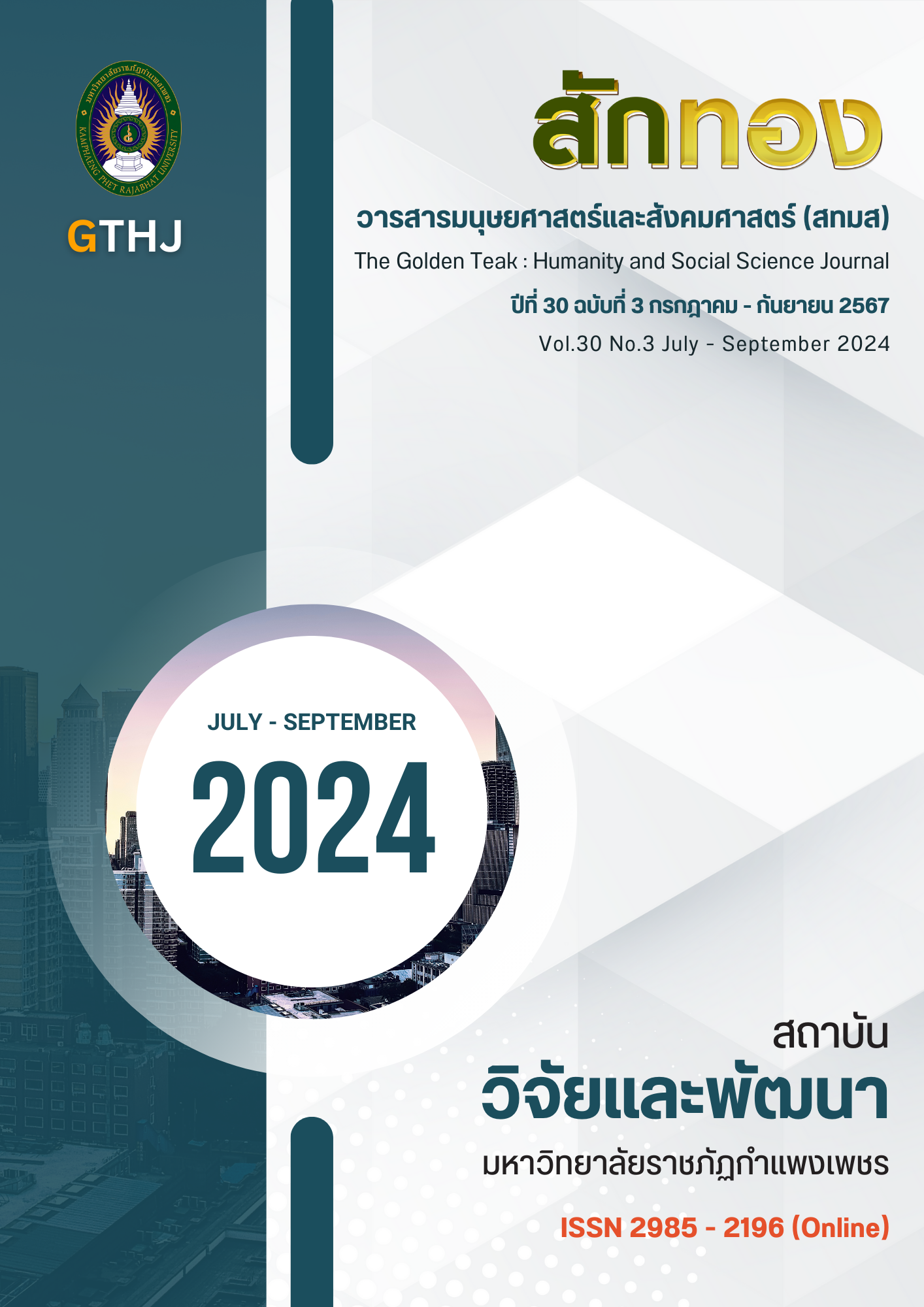Social Capital and Donations during the COVID-19 Pandemic Lockdowns
Main Article Content
Abstract
The objectives of this study were to 1) describe social capital and donation levels; and
2) explore factors influencing donations during Novel Coronavirus 2019 (COVID-19) pandemic lockdowns. Quantitative research was done with data collected by online questionnaire. 1,200 samples were Bangkok residents over age 20. Data was analyzed by descriptive statistics and multiple regression analysis (enter method). Results were that during the pandemic lockdown in Bangkok, samples were displaying high levels of micro and macro-level social capital as well as donation behavior. Samples primarily donated to communities, hospitals, and acquaintances, in decreasing order of significance, at an average individual amount of 2,486.42 baht. In addition, population factors included religion, highest educational level, and pandemic lockdown-related stress, micro-level social capital factors included public consciousness, mutual societal trust, social network participation and macro-level social capital factors included social institutional norms and cultivation as well as faith or religious belief influenced donations at a statistical significance of .05. These findings suggest that relevant sectors should promote the role of strong social capital to build societal immunity at times of crisis.
Article Details

This work is licensed under a Creative Commons Attribution-NonCommercial-NoDerivatives 4.0 International License.
บทความที่ได้รับการตีพิมพ์เป็นลิขสิทธิ์ของวารสาร สักทอง : วารสารมนุษยศาสตร์และสังคมศาสตร์ สถาบันวิจัยและพัฒนา มหาวิทยาลับราชภัฏกำแพงเพชร
ข้อคิดเห็นใดๆ ที่ปรากฎในวารสารเป็นวรรณกรรมของผู้เขียนโดยเฉพาะ ซึ่งมหาวิทยาลัยราชภัฏกำแพงเพชรและบรรณาธิการไม่จำเป็นต้องเห็นด้วย
References
Arpannudin, I., Suryadi, K., Malihah, E. & Anggraeni, L. (2021). Philanthropy : The citizens’ social
capital amidst the pandemic. Proceeding ICHELSS 2021. (pp. 201-212). Jakarta : FIS
UNJ.
Arsyianti, L.D. & Kassim, S. (2021). Charity behavior during COVID-19 pandemic. Turkish
Journal of Islamic Economic, 8, 321-338.
Best, J.W. (1981). Research in education. New Jersey : Prentice Hall.
Burns, N. & Grove, S.K. (1997). The practice of nursing research: Conduct critique and
utilization. (3 rd ed.). Chicago : Rand Mcnally.
Chotiwan, P. (2016). Reed mat weaving and “capitals” of Bang Sakao community in
Chanthaburi. The Golden Teak : Humanity and Social Science Journal, 22(4), 1-17.
[In Thai]
Coleman, J.S. (1994). Foundations of social theory. Cambridge : Harvard University Press.
Cronbach, L.J. (1970). Essential of psychological testing. New York : Harper Row.
Degasperi, N.C. & Mainardes, E.W. (2017). What motivates money donation? a study on
external motivators. Revista de Administração, 52, 363–373.
Dhammakaya Foundation. (2005). A manual of peace: 38 steps towards enlightened living.
Bangkok : Dhammakaya Foundation.
Dhammathai. (2017). Giving. [Online]. Available: https://www.dhammathai.org/treatment/poem
/poem15.php [2020, June 5]. [In Thai]
Glanville, J.L., Paxton, P. & Wang, Y. (2016). Social capital and generosity : A multilevel
analysis. Nonprofit and Voluntary Sector Quarterly, 45(3), 526-547.
Hair, J.F., Black, W.C., Babin, B.J. & Anderson, R.E. (2010). Multivariate data analysis.
London : Prentice Hall.
Hossain, B. & Lamb, L. (2017). Associational capital and adult charitable giving : A Canadian
examination. Nonprofit and Voluntary Sector Quarterly, 46(5), 963-983.
Intria, M. (2017). Social capital. Narkbhutparitat Journal, 9(2), 14-25. [In Thai]
Jonas, K. (2012). Restoring civil societies: the psychology of intervention and engagement
following crisis. In Jonas, K., J. & Morton, T., A. (Eds.), Prosocial behavior in the
context of crisis (pp. 57-77). NJ : Wiley-Blackwell.
Kammun, S. (2008). Social capital and human capital development. [Online].
Available: https://tdri.or.th/wp-content/uploads/2012/11/g3_6_suwanee_final.pdf
, May 30]. [In Thai]
Khazanie, R. (1996). Statistics in a world of applications. (4 th ed.). New York : HarperCollins
College Publishers.
Latané, B. & Darley, J.M. (1970). The unresponsive bystander : Why doesn’t he help?
New York : Appleton-Century-Croft.
National Statistical Office Thailand. (2018). Social, cultural, and mental health survey 2018.
[Online]. Available: www.nso.go.th/sites/2014/DocLib13/ด้านสังคม/สาขาศาสนา/
ภาวะทางสังคมและวัฒนธรรม/2561/Full_report61.pdf [2020, June 25]. [In Thai]
Noor, A.H.M., Isa, N.A.M., Irpan, H.M., Bahrom, H.B, Salleh, A.M. & Ridzuan, A.R.B. (2015).
Characteristic affecting charitable donations behavior: Empirical evidence from
Malaysia. Procedia Economics and Finance, 31, 563-527.
Othman, A. & Sharim, M. H. (2022). Factors influencing the practice of charitable giving
pandemic situations: a preliminary study on Islamic relief Malaysia (IR Malaysia)
donors. Journal of Islamic Philanthropy & Social Finance, 4(2), 1-12.
Phuangprayong, K. (2021). The situation of impact, support needs and adaptation of working
age population during the COVID-19 pandemic : empirical study in Bangkok.
Suthiparithat Journal, 35(1), 266-286. [In Thai]
Puey Ungphakorn Institute for Economic Research. (2020). COVID-19 lockdown: Impact on
Thai workers in supply-side [Online]. Available: https://www.pier.or.th/abridged/2020
/08/ [2020, May 30]. [In Thai]
Putnam, R.D. (2000). Bowling alone: the collapse and revival of American community.
New York : Simon and Schuster.
Putnam, R.D. (2002). Democracies in flux: The evolution of social capital in contemporary
society. Oxford : Oxford University Press.
Ryandono, M.N.H., Kusuma, A., Maryani, A. & Wijayanti, I. (2022). Factors influence online
donation during COVID-19 pandemic. Al-Uqud : Journal of Islamic Economics, 6(1),
-85.
Salleh, A.M., Noor, A.H.M., Bahrom, H., Ridzuan, A.R. & Irfan, H. (2020). Landscape of
individual Muslim giving in Malaysia: An Analysis. Media Syari'ah : Wahana Kajian
Hukum Islam dan Pranata Sosial, 17(1), 39-80.
Stiglitz, J.E. (2012). The price of inequality: How today's divided society endangers our
future. New York : W.W. Norton & Company.
Thai Post. (2020). Bangkok lockdown: Closing 26 types of places. [Online]. Available :
https://www.thaipost.net/main/detail/60470 [2020, May 30]. [In Thai]
Thitatejo, P.D. (2021). Importance and Elements of Sanghahawatthu 4. Journal of Dhamma
for Life, 27(1), 1-10. [In Thai]
Wang, L. & Graddy, E. (2008). Social Capital, Volunteering, and Charitable Giving. Voluntas :
International Journal of Voluntary and Nonprofit Organizations, 19(1), 23-42.


